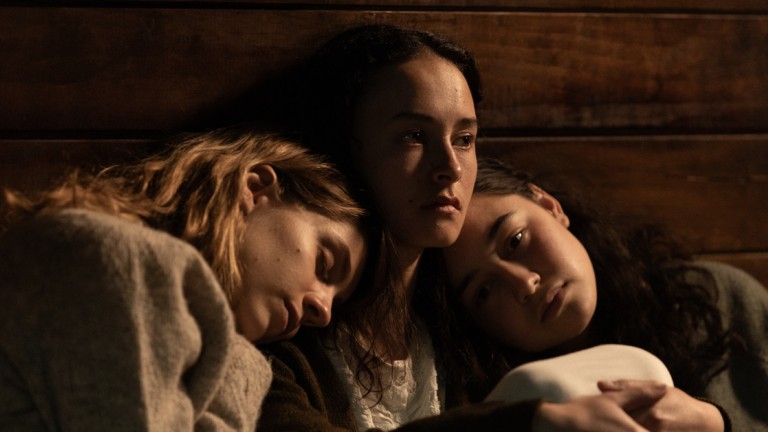
directed by Josephine Stewart-Te Whiu
2024
While the young women in We Were Dangerous were not subject to the sort of procedures meted out by Salem prison dungeonmasters, there’s no competition in misery like this, 1692 Massachusetts to 1954 New Zealand. But this is not a movie about misery. What truly sets Dangerous apart from many other stories about us terrorized down-and-out kids with no map for the future, and no one on our side but maybe those one or two friends, is it lets the joyful moments be and remain joyful. Lets us see them become and remain the bulwark and foundation that the memory of them will be for the characters in the time beyond the film. The film lets so many of those stolen moments – so successfully stolen, so valiantly brilliantly bravely stolen – be joyful, without being instantly crushed by the obvious and impending doom surrounding them in their incarcerated habitations. Even when spirited away, our spirits make paths and forms and freedoms unfathomable.
What a dream. Two Māori teenagers – Nellie and Daisy – join hands with a rich white girl, Lou, whose father thought a school for incorriglble and delinquent girls was just the right amount of scared-straight – but it never is, father. After the two Māori girls, along with another classmate, attempt an escape at film’s open, the classmate fractures her legs, and is afterwards found to be pregnant (and is no longer under the school’s care). All of this prompts The Authorities to send the girls and their fellow inmates away from all temptation to a distant stony island formerly for lepers and bandits, now uninhabited.
They made this movie warm. Debut director Josephine Stewart-Te Whiu, with co-writer Maddie Dai, do not go wrong. Erana James as Nellie is perfectly defiant and compassionate; Manaia Hall as Daisy is fearless and ready to go anywhere if her friends come. And Nathalie Morris as Lou completing the triumvirate is just full of wonder – trodding boards and speaking lines, but whose?
Alas, stolen dreams cannot escape all miseries – and when a Mengele-enthusiast happens by the island to sell the Matron (played frighteningly well by Māori actor Rima Te Wiata) on a forced-sterilization program for these wayward rebels, what’s a girl to do?

Well, everything they should and more. This movie being new, and us wanting so much for its success, we’ll leave out the spoilers. There was nothing worse than finding out from screaming fanatics on the docks what the end of Middlemarch was when the packets came in, oh so many stories ago. I just wanted to scurry home and finish reading it over tea and cookie-crumbs in the old Faithland basement, which was then a prestigious Academy where Lewis Gaylord Clark learned apparently to hate excellent writing by Poe, and Lewis’ brother Willis to write poetry that Poe admired.
Much like 1982’s documentary La Operacion, about the forced-sterilization of Puerto Rican women by the U.S. during the 1950s and 60s, We Were Dangerous treads ground in our histories so horrifying that we want it to be unbelievable. It didn’t matter to Them that the girls they hurt were unconsenting; like it didn’t matter to Them that we didn’t ride brooms and kiss the devil’s backside – they’ll say there is reason enough, because they just always gotta find someone to hurt. As Nellie observes about her peers who give in to the Matron: “You don’t have to believe it, just say it.”
And many fought back. Didn’t we all? I think. We Were Dangrous celebrates us – whether we win or lose, because we joined together and sang a song and did a dance the Matron didn’t like.
And anytime I’ve asked anyone for like the last few hundred years, they’d never heard of Cotton Mather – but they had heard of us witches. And when this film is seen as widely as deserved, they’ll have heard of Daisy and Nellie and Lou, and we’ll all be jealous of their spirit, and do a dance the bully doesn’t like.